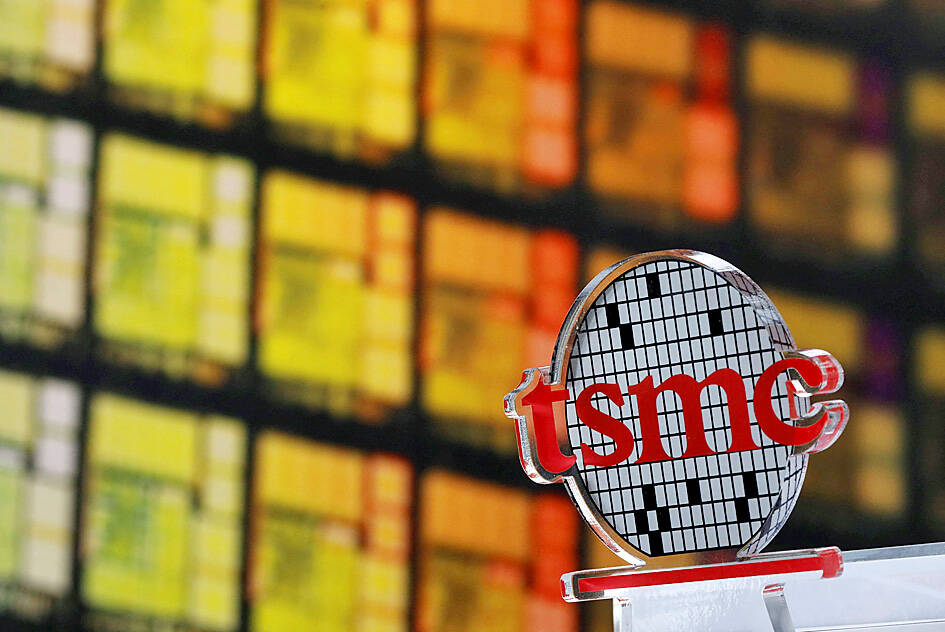Taiwan Semiconductor Manufacturing Co (TSMC, 台積電) retained the top spot among the largest companies in the Asian supply chain in terms of market capitalization, Digitimes Research said.
Citing its Asia Supply Chain Market Cap 100 rankings for last year, the research firm last week said TSMC’s market cap was US$378.45 billion, the highest among Asian suppliers, although it dropped by nearly US$200 billion during the year.
The 34.3 percent fall in TSMC’s market cap was the largest decline of any company in the survey last year, but was typical of how many top-ranking companies fared.

Photo: Tyrone Siu, REUTERS
The top 10 in Digitimes’ rankings all saw their market values tumble last year due to waning COVID-19-induced dividends, Russia’s invasion of Ukraine, COVID-19 lockdowns in China, rising interest rates and global inflation.
The combined market cap of the top 100 Asian suppliers was down 30.9 percent to US$3.3 trillion last year, and 90 percent of the top 100 companies experienced market cap falls during the year.
South Korea’s Samsung Electronics Co had the second-highest market cap of all suppliers at about US$262.8 billion, down 33.1 percent from a year earlier, ahead of Japan’s Toyota Motor Corp — US$225.72 billion in market cap, down 24.4 percent.
Next in order were China-based electric vehicle battery supplier Contemporary Amperex Technology Co (新能源科技) — US$139.29 billion, down 35.4 percent — and Japanese electronics brand Sony Group Corp — US$96.60 billion, down 39.1 percent — the survey showed.
Japan-based sensor, measuring system and laser maker Keyence Corp ranked sixth with a market cap of US$95.46 billion, down 37.5 percent year-on-year, followed by China’s electric vehicle company BYD Co (比亞迪) — US$94.65 billion, down 17.00 percent — and South Korea’s lithium-ion battery maker LG Energy Solution Ltd — US$81.12 billion, no comparison available — the results showed.
Rounding out the top 10 were Chinese home appliance supplier Midea Group Co (美的集團) — US$52.53 billion, down 35.2 percent — and Japanese machinery brand Hitachi Ltd — US$47.91 billion, down 8.5 percent — it said.
In addition to TSMC, five other Taiwanese companies were included in the top 100 list.
Among them, iPhone assembler Hon Hai Precision Industry Co (鴻海精密), the world’s largest contract electronics maker, also known as Foxconn Technology Group (富士康科技集團), took the 14th spot, rising from 21st place in 2021, Digitimes said.
It moved up despite a 13.5 percent year-on-year decline in market cap to US$45.07 billion, the survey showed.
A total of 52 Chinese companies were among the top 100 market cap list, the largest group in the region, ahead of Japan (26), South Korea (eight), Taiwan and India (six each), and Indonesia and Thailand (one each), Digitimes added.
By industry, 28 semiconductor companies were among the top 100 market cap list, the most of any industry, while 21 were in the automotive manufacturing industry, and there were 11 each in the machinery, tech products and equipment, and electrical component sectors, it said.
There were 10 in the electronic components sector, six in the consumer electronics field and two in the automotive component and equipment industry, the survey showed.

UNCERTAINTY: Innolux activated a stringent supply chain management mechanism, as it did during the COVID-19 pandemic, to ensure optimal inventory levels for customers Flat-panel display makers AUO Corp (友達) and Innolux Corp (群創) yesterday said that about 12 to 20 percent of their display business is at risk of potential US tariffs and that they would relocate production or shipment destinations to mitigate the levies’ effects. US tariffs would have a direct impact of US$200 million on AUO’s revenue, company chairman Paul Peng (彭雙浪) told reporters on the sidelines of the Touch Taiwan trade show in Taipei yesterday. That would make up about 12 percent of the company’s overall revenue. To cope with the tariff uncertainty, AUO plans to allocate its production to manufacturing facilities in

TAKING STOCK: A Taiwanese cookware firm in Vietnam urged customers to assess inventory or place orders early so shipments can reach the US while tariffs are paused Taiwanese businesses in Vietnam are exploring alternatives after the White House imposed a 46 percent import duty on Vietnamese goods, following US President Donald Trump’s announcement of “reciprocal” tariffs on the US’ trading partners. Lo Shih-liang (羅世良), chairman of Brico Industry Co (裕茂工業), a Taiwanese company that manufactures cast iron cookware and stove components in Vietnam, said that more than 40 percent of his business was tied to the US market, describing the constant US policy shifts as an emotional roller coaster. “I work during the day and stay up all night watching the news. I’ve been following US news until 3am

COLLABORATION: Given Taiwan’s key position in global supply chains, the US firm is discussing strategies with local partners and clients to deal with global uncertainties Advanced Micro Devices Inc (AMD) yesterday said it is meeting with local ecosystem partners, including Taiwan Semiconductor Manufacturing Co (TSMC, 台積電), to discuss strategies, including long-term manufacturing, to navigate uncertainties such as US tariffs, as Taiwan occupies an important position in global supply chains. AMD chief executive officer Lisa Su (蘇姿丰) told reporters that Taiwan is an important part of the chip designer’s ecosystem and she is discussing with partners and customers in Taiwan to forge strong collaborations on different areas during this critical period. AMD has just become the first artificial-intelligence (AI) server chip customer of TSMC to utilize its advanced

Six years ago, LVMH’s billionaire CEO Bernard Arnault and US President Donald Trump cut the blue ribbon on a factory in rural Texas that would make designer handbags for Louis Vuitton, one of the world’s best-known luxury brands. However, since the high-profile opening, the factory has faced a host of problems limiting production, 11 former Louis Vuitton employees said. The site has consistently ranked among the worst-performing for Louis Vuitton globally, “significantly” underperforming other facilities, said three former Louis Vuitton workers and a senior industry source, who cited internal rankings shared with staff. The plant’s problems — which have not